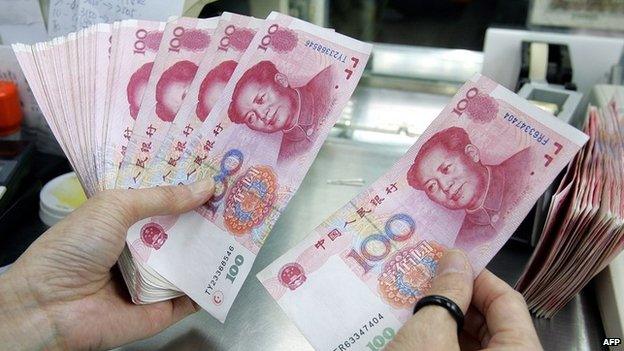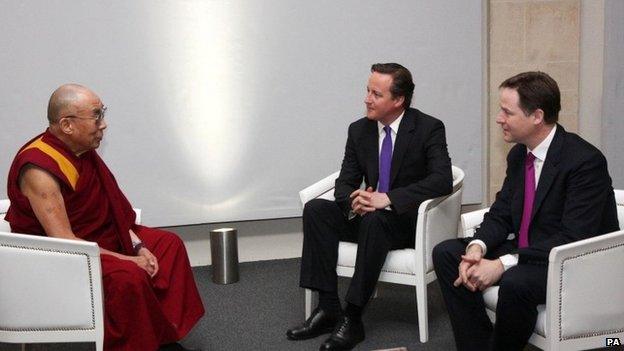Britain’s foreign policy calculations
- Published

London wants to be the leading offshore trader of China's currency
At the London Metal Exchange - owned by China since it was bought by the Hong Kong Stock Exchange three years ago - the shouts of traders haven't been replaced by the silent hum of trading computers.
The other thing that hasn't changed is the importance of the financial sector to the British economy. Preserving the City's position has been a priority for the government - so China unsurprisingly looms large in British foreign policy.
Looking back, the coalition government has repeatedly emphasised the importance of engaging more with emerging markets, so re-balancing away from Europe and towards fast-growing countries like China.
But, with China, there is a balance to be struck between economic gains and addressing political issues such as human rights.
When David Cameron met the Dalai Lama in May 2012, he was cheered by some. But China froze out Britain for more than a year, and when relations finally thawed, Britain seemed to redouble its efforts to make up for lost ground.
The focus of its efforts is the Chinese currency. Dubbed the internationalisation of the RMB or Yuan, the Chinese government is promoting the use of its currency in overseas markets - a significant reform since the RMB is closely controlled and this is the first step towards it becoming freely traded. When it does, the RMB would rival the US dollar in importance.
The government wants London to be the leading Western hub for the offshore trading of the Chinese currency. After all, London is the dominant player in foreign exchange markets, but it wouldn't remain so for long if it didn't trade the RMB.

Cameron and Clegg met the Dalai Lama in 2012, signalling a spiked interest between China and Britain
Britain needs China
Last summer, the Chancellor George Osborne hosted the Chinese premier along with a high-level delegation. They were pleased to announce that Britain was granted links with a Chinese bank that would provide it with RMB which would help cement the government's ambition.
Shortly thereafter, the Luxembourg Finance Minister told me that they were also granted links with a Chinese bank.
And that captures the Chinese attitude toward Europe. China keeps European nations on their toes.
Does China need Britain? Probably not as much as Britain needs China. After all, China can choose to partner with Luxembourg or Germany to access overseas markets.
It may explain why Britain was the first Western nation to apply to join the China-led Asian Infrastructure Investment Bank (AIIB) last month. The AIIB pools money from member countries to invest in infrastructure in Asia.
Others like Germany quickly followed. This was despite American protests since the AIIB is a direct challenge to the World Bank, which is led by America.
The US is critical of Europe shifting East even as President Obama pursues his "Asia Pivot" that reorients American foreign policy towards Asia - though it should be noted that the pivot excludes China in key respects.
For Britain and other nations, it is tricky positioning between two superpowers.
It is worth bearing in mind what the economist John Kenneth Galbraith once observed: "Under capitalism, man exploits man. Under communism, it's just the opposite."